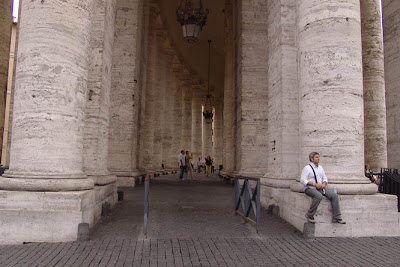 You have a wine placed before you. You might be a judge in a competition. Or you might simply be ordering a wine in a restaurant. In either case the wine is poured. Then, what do you do?
You have a wine placed before you. You might be a judge in a competition. Or you might simply be ordering a wine in a restaurant. In either case the wine is poured. Then, what do you do?Most people look at the color and then move on to the aroma and the taste. But somewhere inside many of us is this little mental punch list. On it is memories, likes, dislikes, markers, highs and lows. Somewhere along the line many of us have gotten that punch list down to a narrow spectrum of what we like and are looking for in a wine. Just like people and foods and music.
 With Italian wine, there is a fork in the road. One way says, stick to the tried and true (whatever that is for each person). The other way is this wild beach party where anything goes.
With Italian wine, there is a fork in the road. One way says, stick to the tried and true (whatever that is for each person). The other way is this wild beach party where anything goes.A man walks into a bar and the bartender hands him a taste of Barbera. The man pulls up his mental punch list:
• deep red color with intense violet hue
• raspberries, blueberries, strawberries blackberry, black cherries
• good acid structure
• low astringency
• lower level of tannins
The wine cannot seduce him, taunt him or convince him that it will be different. If so, it might come off as a flaw. And the dance is over.
“Your brain seems bruised with numb surprise,” the ancient song goes.
 Just once, try and approach a wine you think you know really well and imagine you have lost your memory of it. Maybe that is the essence of blind tasting. But instead of trying to find markers, imagine this is the first time any wine has ever passed your lips.
Just once, try and approach a wine you think you know really well and imagine you have lost your memory of it. Maybe that is the essence of blind tasting. But instead of trying to find markers, imagine this is the first time any wine has ever passed your lips.Learn to forget.
It goes counter to what many Italian wine experts think they should do. They prefer to “speak in secret alphabets” as the same song continues. It’s the battle of the prefrontal cortex, memory vs. attention.
 I’d love to know what someone like Roberto Paris might think about this. At this time Roberto is in the middle of a 10 day meditation retreat in India. I reckon it probably isn’t high on his punch list right now. But the clarity of his mind, after ten days, yes, I’d like to know his thoughts.
I’d love to know what someone like Roberto Paris might think about this. At this time Roberto is in the middle of a 10 day meditation retreat in India. I reckon it probably isn’t high on his punch list right now. But the clarity of his mind, after ten days, yes, I’d like to know his thoughts.Suggestion: Next time you open a bottle of Chianti or Valpolicella, any wine really, instead of trying to figure out what it is and how it fits into those neat little boxes inside your mind, turn your mind loose and let it wander over the wine. Imagine the experience that wine might be, if you could learn to forget.


